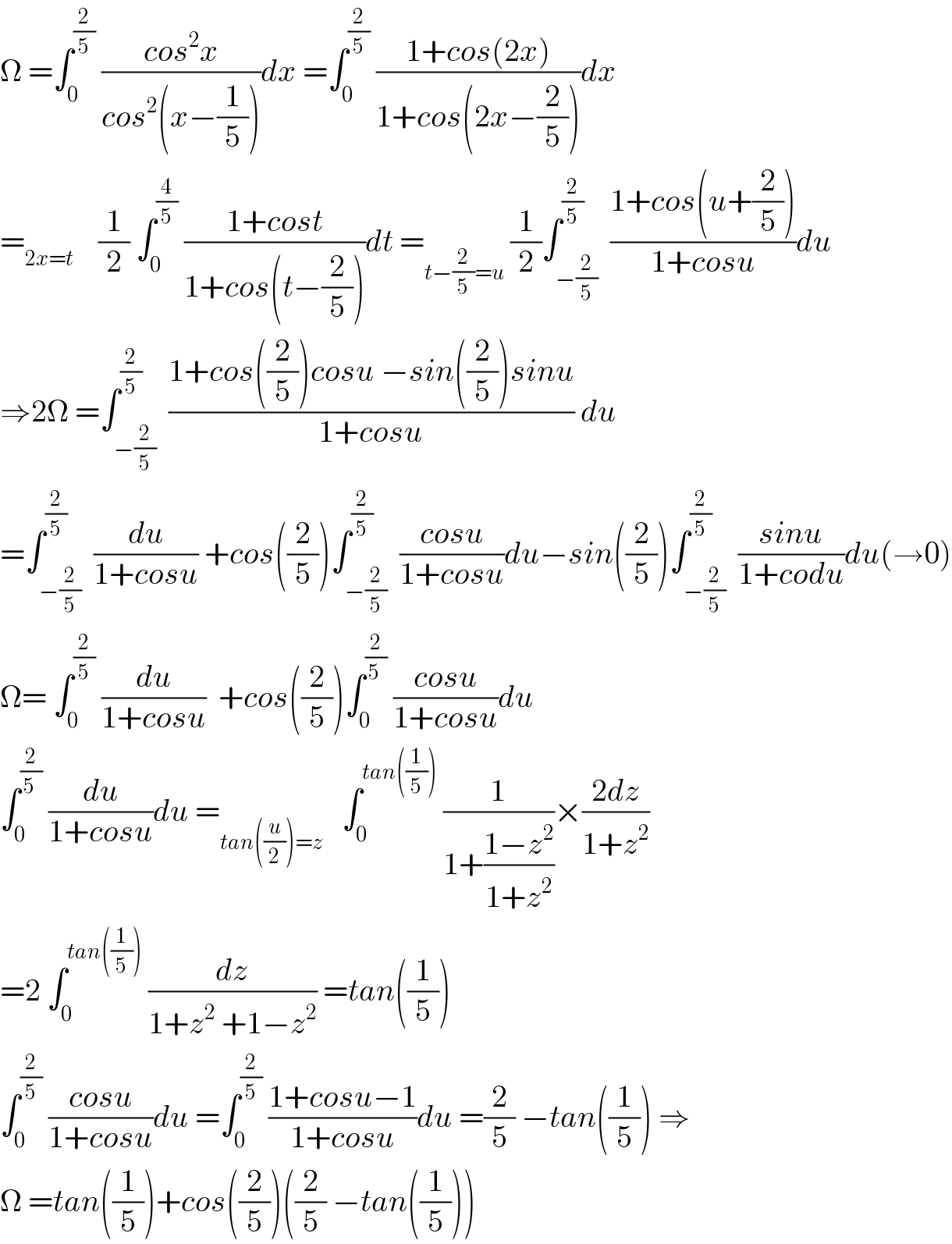Question Number 79520 by TawaTawa last updated on 25/Jan/20

Commented by mathmax by abdo last updated on 26/Jan/20

$$\Omega\:=\int_{\mathrm{0}} ^{\frac{\mathrm{2}}{\mathrm{5}}} \:\frac{{cos}^{\mathrm{2}} {x}}{{cos}^{\mathrm{2}} \left({x}−\frac{\mathrm{1}}{\mathrm{5}}\right)}{dx}\:=\int_{\mathrm{0}} ^{\frac{\mathrm{2}}{\mathrm{5}}} \:\frac{\mathrm{1}+{cos}\left(\mathrm{2}{x}\right)}{\mathrm{1}+{cos}\left(\mathrm{2}{x}−\frac{\mathrm{2}}{\mathrm{5}}\right)}{dx} \\ $$$$=_{\mathrm{2}{x}={t}} \:\:\:\:\frac{\mathrm{1}}{\mathrm{2}}\:\int_{\mathrm{0}} ^{\frac{\mathrm{4}}{\mathrm{5}}} \:\frac{\mathrm{1}+{cost}}{\mathrm{1}+{cos}\left({t}−\frac{\mathrm{2}}{\mathrm{5}}\right)}{dt}\:=_{{t}−\frac{\mathrm{2}}{\mathrm{5}}={u}} \:\frac{\mathrm{1}}{\mathrm{2}}\int_{−\frac{\mathrm{2}}{\mathrm{5}}} ^{\frac{\mathrm{2}}{\mathrm{5}}} \:\frac{\mathrm{1}+{cos}\left({u}+\frac{\mathrm{2}}{\mathrm{5}}\right)}{\mathrm{1}+{cosu}}{du} \\ $$$$\Rightarrow\mathrm{2}\Omega\:=\int_{−\frac{\mathrm{2}}{\mathrm{5}}} ^{\frac{\mathrm{2}}{\mathrm{5}}} \:\frac{\mathrm{1}+{cos}\left(\frac{\mathrm{2}}{\mathrm{5}}\right){cosu}\:−{sin}\left(\frac{\mathrm{2}}{\mathrm{5}}\right){sinu}}{\mathrm{1}+{cosu}}\:{du} \\ $$$$=\int_{−\frac{\mathrm{2}}{\mathrm{5}}} ^{\frac{\mathrm{2}}{\mathrm{5}}} \:\frac{{du}}{\mathrm{1}+{cosu}}\:+{cos}\left(\frac{\mathrm{2}}{\mathrm{5}}\right)\int_{−\frac{\mathrm{2}}{\mathrm{5}}} ^{\frac{\mathrm{2}}{\mathrm{5}}} \:\frac{{cosu}}{\mathrm{1}+{cosu}}{du}−{sin}\left(\frac{\mathrm{2}}{\mathrm{5}}\right)\int_{−\frac{\mathrm{2}}{\mathrm{5}}} ^{\frac{\mathrm{2}}{\mathrm{5}}} \:\frac{{sinu}}{\mathrm{1}+{codu}}{du}\left(\rightarrow\mathrm{0}\right) \\ $$$$\Omega=\:\int_{\mathrm{0}} ^{\frac{\mathrm{2}}{\mathrm{5}}} \:\frac{{du}}{\mathrm{1}+{cosu}}\:\:+{cos}\left(\frac{\mathrm{2}}{\mathrm{5}}\right)\int_{\mathrm{0}} ^{\frac{\mathrm{2}}{\mathrm{5}\:}} \:\frac{{cosu}}{\mathrm{1}+{cosu}}{du} \\ $$$$\int_{\mathrm{0}} ^{\frac{\mathrm{2}}{\mathrm{5}\:}} \:\frac{{du}}{\mathrm{1}+{cosu}}{du}\:=_{{tan}\left(\frac{{u}}{\mathrm{2}}\right)={z}} \:\:\:\int_{\mathrm{0}} ^{{tan}\left(\frac{\mathrm{1}}{\mathrm{5}}\right)} \:\frac{\mathrm{1}}{\mathrm{1}+\frac{\mathrm{1}−{z}^{\mathrm{2}} }{\mathrm{1}+{z}^{\mathrm{2}} }}×\frac{\mathrm{2}{dz}}{\mathrm{1}+{z}^{\mathrm{2}} } \\ $$$$=\mathrm{2}\:\int_{\mathrm{0}} ^{{tan}\left(\frac{\mathrm{1}}{\mathrm{5}}\right)} \:\frac{{dz}}{\mathrm{1}+{z}^{\mathrm{2}} \:+\mathrm{1}−{z}^{\mathrm{2}} }\:={tan}\left(\frac{\mathrm{1}}{\mathrm{5}}\right) \\ $$$$\int_{\mathrm{0}} ^{\frac{\mathrm{2}}{\mathrm{5}}} \:\frac{{cosu}}{\mathrm{1}+{cosu}}{du}\:=\int_{\mathrm{0}} ^{\frac{\mathrm{2}}{\mathrm{5}}} \:\frac{\mathrm{1}+{cosu}−\mathrm{1}}{\mathrm{1}+{cosu}}{du}\:=\frac{\mathrm{2}}{\mathrm{5}}\:−{tan}\left(\frac{\mathrm{1}}{\mathrm{5}}\right)\:\Rightarrow \\ $$$$\Omega\:={tan}\left(\frac{\mathrm{1}}{\mathrm{5}}\right)+{cos}\left(\frac{\mathrm{2}}{\mathrm{5}}\right)\left(\frac{\mathrm{2}}{\mathrm{5}}\:−{tan}\left(\frac{\mathrm{1}}{\mathrm{5}}\right)\right) \\ $$
Commented by TawaTawa last updated on 26/Jan/20

$$\mathrm{God}\:\mathrm{bless}\:\mathrm{you}\:\mathrm{sir} \\ $$
Answered by MJS last updated on 25/Jan/20
![∫((cos^2 x)/(cos^2 (x−(1/5))))dx= [t=x−(1/5) → dx=dt] ∫((cos^2 (t+(1/5)))/(cos^2 t))dt= =((1+cos (2/5))/2)∫dt−sin (2/5)∫tan t dt+((1−cos (2/5))/2)∫tan^2 t dt= and these are easy to solve](https://www.tinkutara.com/question/Q79526.png)
$$\int\frac{\mathrm{cos}^{\mathrm{2}} \:{x}}{\mathrm{cos}^{\mathrm{2}} \:\left({x}−\frac{\mathrm{1}}{\mathrm{5}}\right)}{dx}= \\ $$$$\:\:\:\:\:\left[{t}={x}−\frac{\mathrm{1}}{\mathrm{5}}\:\rightarrow\:{dx}={dt}\right] \\ $$$$\int\frac{\mathrm{cos}^{\mathrm{2}} \:\left({t}+\frac{\mathrm{1}}{\mathrm{5}}\right)}{\mathrm{cos}^{\mathrm{2}} \:{t}}{dt}= \\ $$$$=\frac{\mathrm{1}+\mathrm{cos}\:\frac{\mathrm{2}}{\mathrm{5}}}{\mathrm{2}}\int{dt}−\mathrm{sin}\:\frac{\mathrm{2}}{\mathrm{5}}\int\mathrm{tan}\:{t}\:{dt}+\frac{\mathrm{1}−\mathrm{cos}\:\frac{\mathrm{2}}{\mathrm{5}}}{\mathrm{2}}\int\mathrm{tan}^{\mathrm{2}} \:{t}\:{dt}= \\ $$$$\mathrm{and}\:\mathrm{these}\:\mathrm{are}\:\mathrm{easy}\:\mathrm{to}\:\mathrm{solve} \\ $$
